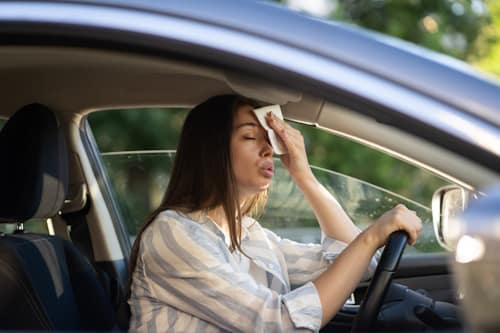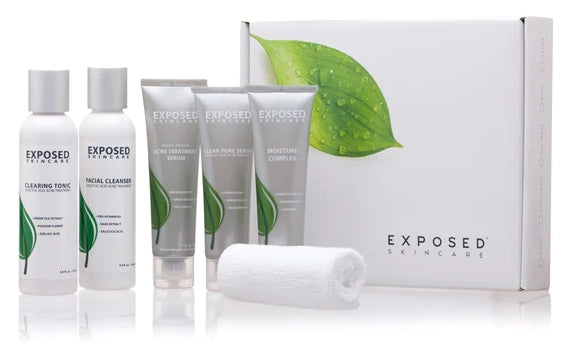Acne, a common skin condition experienced by people of all ages, can be a source of discomfort and self-consciousness. While numerous factors contribute to its onset, it's crucial to understand what makes acne worse.
This knowledge can empower individuals to make informed decisions about their skincare routine and lifestyle choices, aiding in the effective management of acne.
Also read: How to choose the best acne treatment
Biggest Take-Aways:
- Hormonal changes, dietary habits, and stress are significant factors that can worsen acne.
- Inappropriate skin care practices, like over-washing or using harsh scrubs, can exacerbate acne.
- Acne treatment requires consistency and patience, with a focus on using products suitable for acne-prone skin.
- Exposed Skin Care offers a comprehensive solution for acne management, effectively targeting acne-causing bacteria and maintaining skin health.

What Makes Acne Worse? Understanding the Contributing Factors
Hormonal Changes: A Key Factor in Acne Exacerbation
- Puberty and Teenage Acne: Hormonal fluctuations during puberty can increase oil gland activity, leading to clogged pores and breakouts.
- Adult Acne and Hormonal Imbalance: For adults, especially women, hormonal changes related to menstrual cycles, pregnancy, or certain medications can worsen acne.
Dietary Habits That Can Worsen Acne
- High-Glycemic Foods: Consumption of sugary, high-glycemic foods can trigger acne by increasing insulin levels, thus boosting sebum production.
- Dairy Products: Some studies suggest that milk and dairy products may aggravate acne in certain individuals.
Lifestyle and Environmental Factors
- Stress: Elevated stress levels can increase cortisol, exacerbating acne.
- Environmental Pollutants: Exposure to dirt and pollution can clog pores and worsen acne.
- Climate Changes: Extreme weather conditions, be it humidity or dryness, can impact skin health and exacerbate acne.

Daily Habits That Are Making Your Acne Worse
Inadequate Skin Care Practices
- Over-Washing or Under-Washing: Washing your face more than twice a day or not enough can disturb skin balance, making acne worse.
- Using Harsh Scrubs: Scrubs can irritate acne-prone skin and cause micro-tears, leading to more breakouts.
- Incorrect Product Usage: Using skin care products unsuitable for acne-prone skin can exacerbate the condition.
Makeup and Cosmetic Products
- Comedogenic Products: Certain makeup and skin care products can clog your pores and cause acne breakouts.
- Not Removing Makeup Properly: Sleeping with makeup on can clog pores and lead to acne.
Hair Care Products and Acne
- Product Residue: Hair products can drip onto the skin and clog pores, especially around the hairline.
- Frequent Touching of Hair and Face: Transferring oils and product residue from hair to face can contribute to acne.

Understanding the Role of Medication and Acne
- Certain Medications: Some medications can cause acne or make existing acne worse. This includes corticosteroids, lithium, and certain hormonal therapies.
- Misuse of Acne Medications: Incorrect use of acne medication can lead to increased irritation and worsening of acne.
The Impact of Touching and Picking at Your Skin
- Touching Your Face Too Often: Our hands carry oils and bacteria that can clog pores and cause acne.
- Picking and Squeezing Pimples: This habit can spread bacteria, increase inflammation, and lead to acne scars.
The Surprising Link Between Exercise and Acne
- Sweat and Acne: While exercise is beneficial, sweat can mix with bacteria and oils on the skin, potentially clogging pores.
- Workout Gear and Acne: Dirty workout clothes and equipment can harbor bacteria that may cause breakouts.
How Your Laundry Habits Affect Acne
- Bed Linens and Towels: Dirty linens and towels can transfer oils and bacteria back onto your skin, leading to acne.
- Laundry Detergents: Some detergents contain ingredients that can irritate your skin and worsen acne.

Genetics and Acne: Is There a Connection?
- Family History: If your parents had acne, you're more likely to develop it too. Genetics can play a role in how your skin reacts to certain triggers.
- Inherited Skin Types: People with naturally oily skin, a hereditary trait, are more prone to developing acne.
The Role of Weather and Seasonal Changes
- Humidity: High humidity can lead to sweating, which can clog pores and cause acne.
- Cold Weather: Dry, cold weather can strip the skin of moisture, leading to dryness and potentially worsening acne.
Acne and Your Mental Well-being
- Stress-Induced Acne: High-stress levels can worsen acne by increasing the body's production of hormones like cortisol.
- The Psychological Impact: Living with acne can also contribute to stress and anxiety, creating a vicious cycle.
The Benefits of Exposed Skin Care in Acne Management
Exposed Skin Care has emerged as a popular choice in the realm of acne treatment, offering a comprehensive solution to those aiming to treat acne effectively. It addresses various factors contributing to acne, making it a viable option for those struggling to get rid of acne
Here are some key benefits:
- Targeted Acne Treatment: Exposed Skin Care specifically targets acne-causing bacteria, reducing the likelihood of new acne breakouts.
- Deep Cleansing Action: The cleanser in this line is adept at penetrating hair follicles, ensuring the removal of dead skin cells and excess oil, which are common culprits in blackhead formation.
- Prevention of Severe Acne: Regular use can help in managing severe acne, preventing it from escalating by keeping the pores clear and reducing inflammation.
- Safe for Various Skin Types: The products are formulated to be gentle on different skin types, minimizing the risk of irritation.
- Focus on Overall Skin Health: While focusing on acne, Exposed Skin Care also contributes to overall skin health, potentially aiding in the prevention of issues like skin cancer by maintaining healthy skin.
Incorporating Exposed Skin Care into your routine can offer a balanced and effective approach to combat acne, ensuring both treatment and prevention for clearer, healthier skin.
Conclusion
Understanding the symptoms and causes of acne is crucial in identifying ways you may be making your acne worse. It's essential to recognize that different types of acne require varied approaches.
For instance, washing your skin too aggressively or scrubbing your face harshly can strip the surface of your skin of its natural oils, leading to dryness and irritation. This can worsen your acne, especially if you're not using acne medication evenly or fail to pat your skin dry with a clean towel.
Moreover, it's essential to be mindful of the products you use. Ingredients that can cause irritation or clog pores often result in acne. For people with acne, this means being cautious about everything from the cleansers they use to how often they wash their face.
Overwashing can dry out your skin and disrupt its natural balance, which can, in turn, exacerbate acne issues. In terms of treatment, using an acne medication or a specialized skin care system, like Exposed Skin Care, can be beneficial.
Exposed Skin Care is developed with the needs of acne-prone skin in mind and can help clear your acne more effectively. It treats your acne by targeting the root causes, such as acne-causing bacteria and clogged pores, while ensuring the skin remains balanced and healthy.
Remember, acne is also a condition that varies greatly among individuals. What works for one person may not work for another, so it's essential to understand your own skin's needs. Consistency in your skincare routine and making informed choices about the products you use are key.
FAQs
Can Changing My Diet Really Help Reduce Acne?
Modifying your diet to reduce high-glycemic and dairy products can help manage acne, as these can trigger hormonal changes that exacerbate skin issues.
Does Stress Directly Cause Acne?
While stress doesn't directly cause acne, it can worsen existing conditions by increasing cortisol levels, which in turn can increase oil production and inflammation.
Is It Harmful to Wash My Face Frequently?
Yes, washing your face too often can strip it of essential oils, leading to dryness and irritation, which can exacerbate acne. It's best to wash your face no more than twice a day.
How Do Hair Care Products Affect Acne?
Hair care products can drip onto the skin and clog pores, especially around the hairline. Using non-comedogenic hair products and keeping hair clean to prevent acne is advisable.
What Makes Exposed Skin Care Effective for Acne Treatment?
Exposed Skin Care is effective because it targets acne-causing bacteria, cleanses pores deeply, and is gentle on various skin types. It helps treat and prevent new breakouts while maintaining the skin's overall health.
















